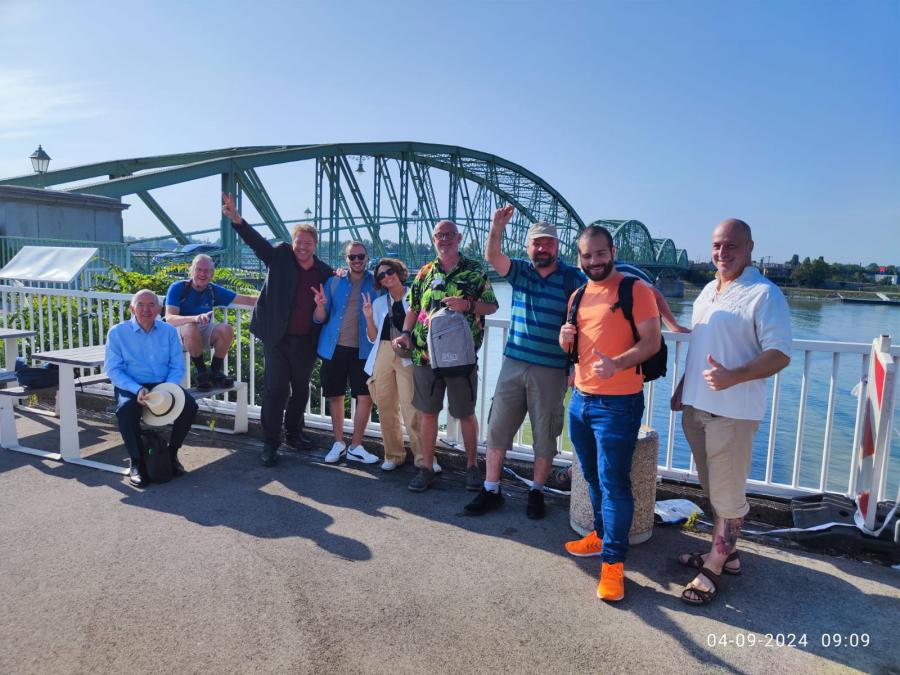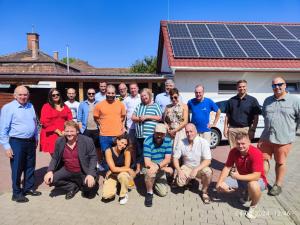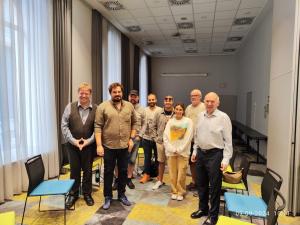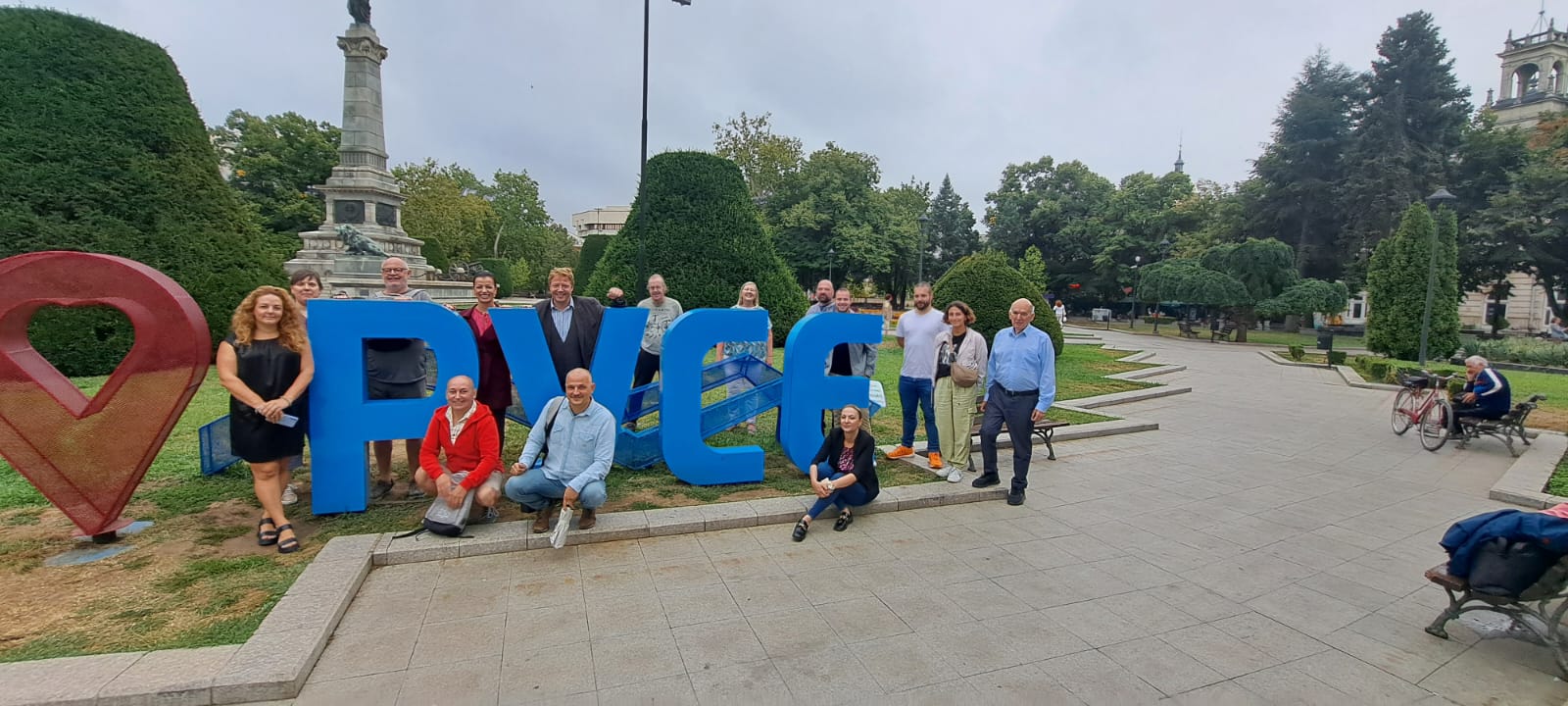
Journalists examine the impact of EU Cohesion Funds during field visit in Eastern Europe
BUDAPEST, HUNGARY, September 16, 2024 /EINPresswire.com/ -- From September 3 to 12, 2024, a group of journalists and civil society representatives embarked on an intensive journey through five Eastern European countries — Hungary, Croatia, Slovakia, Romania, and Bulgaria — to evaluate the impact of the European Cohesion Fund in these regions. This trip, known as Cohesion Field Visit 1, revealed the crucial role of EU investments in promoting cross-border cooperation, community building, and regional development.Throughout the journey, participants engaged with local communities, government representatives, and experts to gain insight into the successes and challenges of the EU Cohesion Policy.
Key moments from the journey
The journey began on Tuesday, September 3, 2024, in Budapest, where the group of journalists met with a team of Ukrainian women. This laid the focus on cross-border cooperation and the importance of cultural exchange. These discussions set the tone for the rest of the journey. The group then traveled to Slovakia, where they arrived at the Peklo Pokol Hotel in Komarno, which served as their base for the first part of the trip. After checking in, they participated in an orientation session outlining the objectives of the visit.
Cross-border cooperation in action
On Wednesday, September 4, 2024, the group visited the local market in Komarno and held informal discussions with citizens about their lives in this border region. They then crossed the Monostori Bridge into Komárom, Hungary — a symbol of cross-border cooperation funded by the EU. During a roundtable discussion with local citizens, they explored topics such as the Schengen Area, cross-border collaboration, and the significance of the Danube for the region.
A historical journey through Slovakia
On Thursday, September 5, 2024, the group traveled from Komarno to Kecskemét, Hungary, where they discussed challenges surrounding press freedom and media pluralism with local journalists. The trip continued to Osijek, Croatia, where they arrived in the evening and stayed at Hotel Central.
The unbreakable spirit of Vukovar
On Friday, September 6, 2024, the group visited Vukovar, Croatia. They held a roundtable discussion with local youth about unemployment and the so-called “brain drain.” Vukovar, heavily impacted by the Balkan Wars, was a key example of how EU funding helps with reconstruction and social cohesion. A boat trip on the Danube to Vukovar Island gave the group a unique perspective on the city’s recovery.
European cooperation in Vukovar
On Saturday, September 7, 2024, the group returned to Vukovar for discussions on trust-building, EU membership, and cross-border cooperation with local citizens. They also visited key sites along the Danube, learning how EU investments are revitalizing local industries and boosting tourism. That evening, the group traveled back to Budapest, where they stayed at the ibis Styles Budapest Center.
Budapest — the role of media in promoting cohesion
Sunday, September 8, 2024, was a free day in Budapest, allowing participants to reflect on the first half of the journey. On Monday, September 9, 2024, the group held an engaging discussion with Hungarian journalist Zsolt Kerner about the role of the media in promoting cohesion, particularly in regions facing political and social divisions.
Giurgiu — a gateway to modernization
On Monday, September 9, 2024, the group flew to Bucharest, Romania, and then traveled to Giurgiu, a city benefiting from EU infrastructure investments. There, they visited the nearby village of Comana, known for its traditional crafts and EU employment initiatives. This project demonstrated how EU policies are helping local communities preserve their cultural heritage while creating new jobs.
Technological advancements in Ruse
On Wednesday, September 11, 2024, the participants visited Ruse in Bulgaria, where they gained insight into the innovative technologies being developed in the region, thanks in part to EU funding. They met with local researchers and PhD students who are pioneering work in digital innovation and sustainable energy.
Byala — a city of solidarity
On Thursday, September 12, 2024, the group concluded their journey in Byala, Bulgaria. They witnessed the solidarity of local communities supporting Ukrainian refugees and visited EU-funded projects that contribute to rebuilding and safety.
European cohesion
At the end of the trip, the participants reflected on the immense impact that EU Cohesion Funds have on regional development. This 10-day journey highlighted that EU investments are not only focused on infrastructure but are also about building bridges between people and strengthening communities. However, the journey also underscored ongoing challenges such as youth unemployment and regional disparities, which must be addressed to ensure a truly united Europe.
Organizers and participants in the Everyday Cohesion Project
The Everyday Cohesion Project brought together journalists and civil society representatives from across Europe. Organizers Miklos Barabas and Emese Barabas of European House Budapest played a crucial role in planning and executing this journey. Thanks to their efforts, participants were able to experience the impact of EU Cohesion Policy in five different countries.
Participants
Each participant contributed valuable insights on EU Cohesion Policy. The group included Lise Kristensen (Denmark), Kurt Nielsen (Denmark), Stefan Rochow (Germany), Benedikt Dario Rochow (Germany), Andrea Denaro (Italy), Claudia Mangano (Italy), Rutger Van den Hoofdakker (Netherlands), and Andy Vermaut (Belgium/Netherlands).
Andy Vermaut
Member of the European Press Federation
+32 499 35 74 95
denktankcarmenta@gmail.com
Distribution channels: Agriculture, Farming & Forestry Industry, Book Publishing Industry, Business & Economy, Companies, Conferences & Trade Fairs, Culture, Society & Lifestyle, Education, Environment, Human Rights, International Organizations ...
Legal Disclaimer:
EIN Presswire provides this news content "as is" without warranty of any kind. We do not accept any responsibility or liability for the accuracy, content, images, videos, licenses, completeness, legality, or reliability of the information contained in this article. If you have any complaints or copyright issues related to this article, kindly contact the author above.
Submit your press release




